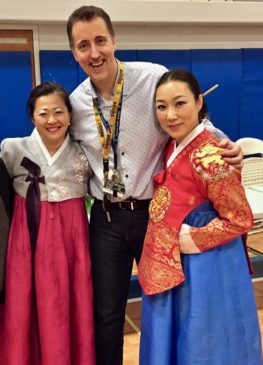
[slideshow_deploy id=’899′]
BY SUSAN MCTIGUE
CORRESPONDENT
CLOSTER, N.J. — The uniting of North Korean and South Korean delegations at the 2018 Winter Olympic games in Pyeongchang has been in the headlines since before the games even began. As the Olympics draw to a close, halfway around the world in Closter, where more than one in three residents is of Korean descent, opinions about the event reflect both political and personal feelings.
A bit of history may help explain the current political circumstances. At the end of World War II in 1945, the Japanese Empire was dismantled and their 35-year control over Korea led to a split at the 38th parallel between the north, where the Russians installed a communist regime, and the south, controlled by the Americans. The Chinese soon took over the north, and the south became the pro-Western Republic of Korea. The ensuing Korean War was fought because the communist army led by Kim Il-sung invaded the south in 1950 in an attempt to take over the peninsula. The invasion was defended by a United Nations coalition led by Americans under the direction of Gen. Douglas MacArthur. Although the war ended in 1953 at great cost and loss of 5 million lives, no peace treaty was signed, leaving both countries technically still at war.
Today, South Korea is a freedom-loving economic powerhouse and ally of the United States, while North Korea contrasts under an impoverished dictatorship that has threatened America with nuclear war. Few people expect that the two countries will ever become one because of extreme political and economic differences, but the Olympics has provided a small step toward opening a conversation about re-uniting people who share common threads of history and culture.
James J. Kim, owner of The UPS Store in Closter Commons, had strong opinions about the two nations sharing one Olympic team.

“They talk about peace, but the North only wants to prevail with their power and make both countries communist. What’s happened with the Olympics is just for show, but sanctions placed on the North are so severe that they have no choice but to reach out to the world, hoping that sanctions will be reduced since their people are starving,” Kim said.
He further explained that “there are two different mentalities, where the younger generation of North Koreans are systematically conditioned to love communism and hate the United States, and an older generation of South Koreans who remember the Korean War when more than 35,000 Americans gave their lives to preserve the country’s freedom.”
[slideshow_deploy id=’899′]
The International Olympic Committee strives to create an environment where athletes can compete without the interference of politics, although the reality may be somewhat different. South Korean President Moon Jae-in explained to the United Nations in September that the Olympics “will become a candle that sheds light on peace,” acknowledging the symbolism of Korean athletes competing together rather than as adversaries.
Closer to home in Closter, board of education member Chris Kwon said she was happy to see the countries come together at the Olympics, while admitting that it is a very small step.

“It’s better than nothing, and something that we can build on to take to the next level in the future,” she shared. “It would be a big step if friends and family could visit each other by crossing the border one day.”
Kwon also noted the animosity in South Korea where some athletes were prevented from competing on their country’s team because North Korean athletes were given slots instead.
Sunny Kim, who is an active member of the Closter Korean Parents Organization, pointed out that the joint Korean women’s hockey team had little opportunity to train together, unlike every other team competing in the Olympics, so putting them together on the ice was purely symbolic. As for the tensions between the United States and North Korea over threats of war and the use of nuclear weapons, Kim explained that her family and others living in South Korea pay little heed to the hostility.
“They are immune to it and go about their business and live their lives,” she said. “If they got caught up in those threats flung back and forth across the ocean, they’d never be able to function normally.”
Those interviewed agreed that the effort to have a unified Olympic team was an obvious political move that will have little long-lasting impact on bridging the two countries that remain so diametrically opposite.
The closing ceremony of the 2018 Winter Olympics in Pyeongchang is on Sunday, Feb. 25.
Photos by Susan McTigue
[slideshow_deploy id=’899′]
